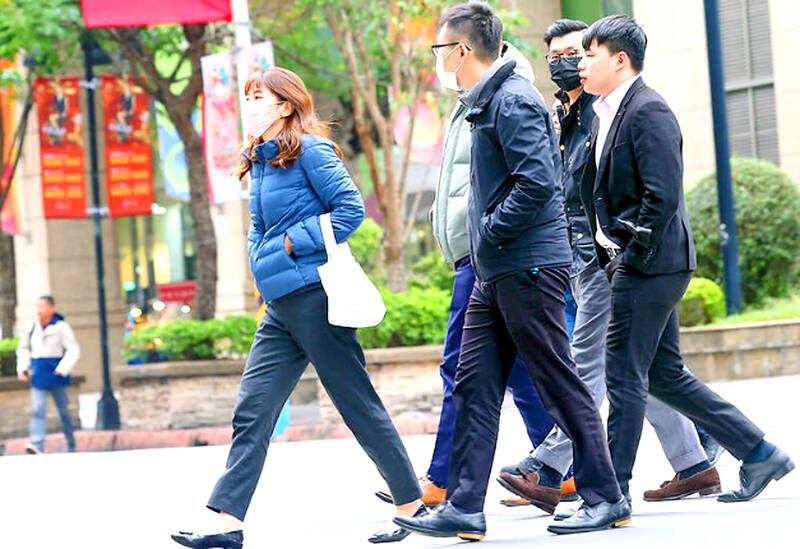The gender pay gap in Taiwan last year was 15.8 percent, slightly higher than the 15.1 percent in 2023, Ministry of Labor data showed yesterday.
The average hourly wage for males last year was NT$389, compared with NT$327 for women, meaning that woman on average would have needed to work 58 more days than males to make the same annual salary, up two days from 2023, the ministry said in a report.
The pay gap was a result of several factors, including the nature of the occupations typically dominated by one sex, as well as seniority, education and qualifications trends, the report said.

Photo courtesy of the Workforce Development Agency via CNA
The widening of the pay gap last year was greatly influenced by a few major industries with wide pay gaps, including the electronic components manufacturing industry, which had an average wage of NT$668 per hour among males and NT$393 among women, it said, adding that the gap was 41.2 percent, 1.9 percentage points higher than 2023.
The gap also widened in the food and healthcare sectors, which could be due to how positions are distributed in the industries and differences in raises, the report said.
Excluding the electronic components, food and healthcare industries, the wage gap last year was 11.5 percent, 0.3 percentage points higher than in 2023, it said.
Taiwan’s gender wage gap remained lower than in Japan and South Korea, which in 2023 reported 29.7 percent and 29 percent respectively, it added.

An undersea cable to Penghu County has been severed, the Ministry of Digital Affairs said today, with a Chinese-funded ship suspected of being responsible. It comes just a month after a Chinese ship was suspected of severing an undersea cable north of Keelung Harbor. The National Communications and Cyber Security Center received a report at 3:03am today from Chunghwa Telecom that the No. 3 cable from Taiwan to Penghu was severed 14.7km off the coast of Tainan, the Ministry of Digital Affairs said. The Coast Guard Administration (CGA) upon receiving a report from Chunghwa Telecom began to monitor the Togolese-flagged Hong Tai (宏泰)

A cat named Mikan (蜜柑) has brought in revenue of more than NT$10 million (US$305,390) for the Kaohsiung MRT last year. Mikan, born on April 4, 2020, was a stray cat before being adopted by personnel of Kaohsiung MRT’s Ciaotou Sugar Refinery Station. Mikan was named after a Japanese term for mandarin orange due to his color and because he looks like an orange when curled up. He was named “station master” of Ciaotou Sugar Refinery Station in September 2020, and has since become famous. With Kaohsiung MRT’s branding, along with the release of a set of cultural and creative products, station master Mikan

RISING TOURISM: A survey showed that tourist visits increased by 35 percent last year, while newly created attractions contributed almost half of the growth Changhua County’s Lukang Old Street (鹿港老街) and its surrounding historical area clinched first place among Taiwan’s most successful tourist attractions last year, while no location in eastern Taiwan achieved a spot in the top 20 list, the Tourism Administration said. The listing was created by the Tourism Administration’s Forward-looking Tourism Policy Research office. Last year, the Lukang Old Street and its surrounding area had 17.3 million visitors, more than the 16 million visitors for the Wenhua Road Night Market (文化路夜市) in Chiayi City and 14.5 million visitors at Tainan’s Anping (安平) historical area, it said. The Taipei 101 skyscraper and its environs —

Taiwan on Friday said a New Zealand hamburger restaurant has apologized for a racist remark to a Taiwanese customer after reports that it had first apologized to China sparked outrage in Taiwan. An image posted on Threads by a Taiwanese who ate at Fergburger in Queenstown showed that their receipt dated Sunday last week included the words “Ching Chang,” a racial slur. The Chinese Consulate-General in Christchurch in a statement on Thursday said it had received and accepted an apology from the restaurant over the incident. The comment triggered an online furor among Taiwanese who saw it as an insult to the